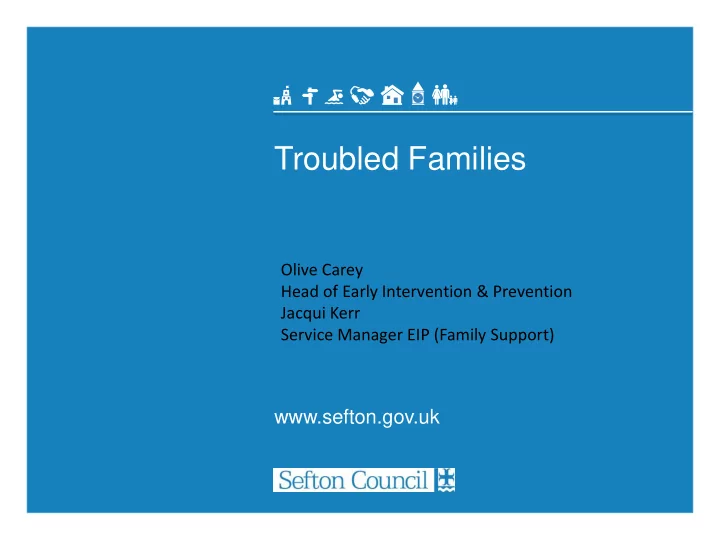

Troubled Families Olive Carey Head of Early Intervention & Prevention Jacqui Kerr Service Manager EIP (Family Support) www.sefton.gov.uk
Troubled Families ‘The Troubled Families Programme aims to change the way services are run, save taxpayers money and turn around the lives of some of the hardest to help in the country.’ – Children back in school – Youth crime and anti-social behavior reduced – Adults better able to work
What are we trying to achieve? • Transforming local services • Whole Family Working • Single Lead Practitioner delivering an family outcome based plan supported by a Team Around The Family (TAF) • Using a mix of methods that support families and challenge poor behaviour • Up- skilling the workforce • Right intervention at the right time with the least change of worker
Payment by Results The main aim of the programme is to transform services so that we are better able to support families to become independent self reliant and resilient. Funding is split into 2 elements: • Attachment fee • Payment by results: – Reduction in Offending or ASB for 6 months following an order – Average 85% attendance in school over 3 terms – Adult family member moves into work and sustains employment for 6 months or makes progress to work
Governance • Troubled Families is part of the Family Support Team of Early Intervention & Prevention. • A steering group chaired by Peter Morgan includes leads from – LA teams – EIP, BIP, Sefton@Work and Public Health – External Teams – Job Centre plus, One Vision, Merseyside Police, Merseyside Fire & Rescue, Merseyside Probation, Merseycare and Sefton CVS
Results to date • Supporting 650 families • Turned around 72% of families we expect this to be nearer 85% once October claim is submitted – ‘Turned Around’ indicates that the payment by results measures have been achieved • Early Help Pathway with strong linkages to Social Care • Agreed improvement plan with key investment strands • Practitioners from across LA teams, Police and Housing have completed their level 4 qualification in supporting families • Developed an integrated family intervention model with secondary schools • Multi agency delivery plan to support more adults into work or programmes to build up their employability skills
Phase 2 • Due to our performance we will be rolling out the Extended TF Programme from January 2015 which will support approx 2000 families over the next 5 years • To be eligible for the expanded programme, each family must have at least two of the following six problems: 1. Parents and children involved in crime or anti-social behaviour. 2. Children who have not been attending school regularly. 3. Children who need help. 4. Adults out of work or at risk of financial exclusion and young people at risk of worklessness. 5. Families affected by domestic violence and abuse. 6. Parents and children with a range of health problems.
Current Identification & Shared Intelligence • YOT Troubled Family • AWS Criteria – database • ASB • JC+ search • Riverside/One Vision • CAF Further details re • Social Care current plans • Orders • Housing case work • MARGG – organised crime MA groups with • MARGG – young people info on above • MACSE • Other RSLs case work families • Linacre Derby Panel
Pathway Tracking Impact and Outcomes Allocated via Early Case studies Help Gateway Payment by Results • EIP staff • EIP Commissioned • TF Partnership Business as usual • Coordinated CAF plan • Lead Practitioner • Team around the Family • Early Help Interventions • Specialist assessments
Issues for SSCP to discuss • Gaps in delivery model for families involved in organised crime or asb • Effectiveness of integrated pathways • Sharing information • Do we have the skills to deliver the right intervention at the right time with the least change of worker? • What are our challenges now and how can TF support us to do things differently?
Recommend
More recommend